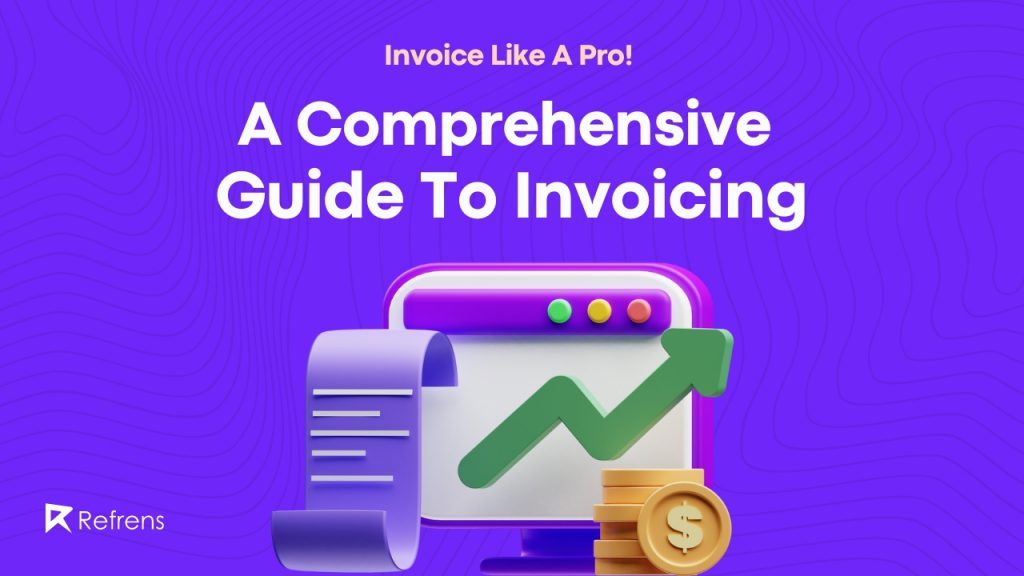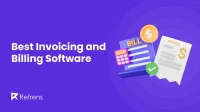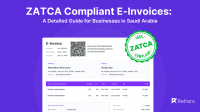Managing your finances is an essential aspect of running a successful business or freelancing career. One key component of this process is invoicing, which allows you to bill your clients for products or services provided. Whether you’re new to the world of invoicing or looking to refine your existing process, our Invoicing guide is here to help.
In this comprehensive guide, we’ll cover everything you need to know about invoicing, from the basics to best practices, and even advanced topics like international invoicing and tax compliance. Our aim is to provide an educational and informative resource that is simple enough for beginners to understand while still offering valuable insights for experienced professionals. We’ll also explore the best invoicing software to streamline your billing process and ensure timely payments.
By following this guide, you’ll gain a better understanding of invoicing, learn how to create professional invoices that reflect your brand identity and discover strategies for ensuring timely payments and resolving disputes. Additionally, we’ll explore the benefits of using online invoicing software and the importance of staying compliant with tax regulations.
So, whether you’re just starting your business journey or you’re a seasoned pro looking to optimize your invoicing process, this guide is for you. Let’s dive in and master the art of invoicing!
What Is An Invoice?
An invoice is a financial document issued by a seller (also known as the supplier or service provider) to a buyer (the client or customer) that outlines the products or services rendered, their associated costs, and the payment terms. In simple terms, an invoice is a bill that serves as a formal request for payment.
Why Do You Need To Take Invoicing Seriously?
Invoices play a crucial role in business transactions and serve several essential purposes. More than just professionalism, it’s legal proof of transaction, necessary for tax compliance, and important for tracking & record-keeping purposes.
1. Legal Proof of Transaction
An invoice serves as a legally binding document that outlines the agreement between the seller and the buyer. It acts as evidence of the goods or services provided and the payment terms agreed upon.
2. Record-keeping
Invoices help both parties maintain accurate financial records. For the seller, invoices track revenue, while for the buyer, they help monitor expenses. These records are essential for budgeting, financial analysis, and tax reporting purposes.
3. Tax Compliance
Invoices are necessary for tax compliance, as they include important details such as the seller’s and buyer’s tax identification numbers, the total amount due, and any applicable taxes (e.g., sales tax, VAT, or GST).
Invoices play a crucial role in tax compliance, and having a robust system in place can streamline VAT refunds for multinational businesses. This is particularly important for those engaged in international sales who need to navigate the complexities of different tax jurisdictions effectively
4. Payment Tracking & Reminders
Invoices typically include payment terms and due dates, which helps sellers track payments and follow up with clients on outstanding balances. Buyers, on the other hand, can use invoices to manage their accounts payable and ensure timely payments.
5. Professionalism
Issuing well-structured, clear, and branded invoices reflects a professional image for your business, ensuring clients view you as a reliable and trustworthy service provider.
The Different Types of Invoices & When To Use Which
There are various types of invoices tailored to different business scenarios and specific stages of a transaction. Understanding these different types and knowing when to use each one can help streamline you invoicing process and improve your cash flow management.
Here are the most common types of invoices and their uses:
1. Standard Invoice
A standard invoice is the most common type of invoice used by businesses. It lists the goods or services provided, their associated costs, and the payment terms. It is typically used when a sale is complete, and payment is due within a specified period.
2. Proforma Invoice
A proforma invoice is a preliminary bill issued before the final standard invoice. It serves as an estimate or quote, providing the client with an overview of the expected costs for the products or services to be delivered. Proforma invoices are not legally binding and are not recorded as accounts receivable by the seller or accounts payable by the buyer.
3. Credit Note
A credit note, also known as a credit memo, is issued when the seller needs to credit the buyer’s account, typically due to a refund, a discount, or returned goods. It indicates the amount the seller owes the buyer, which can be applied against future purchases or refunded.
4. Debit Note
A debit note, or debit memo, is the opposite of a credit note. It is issued when the seller needs to charge the buyer an additional amount due to an undercharge, a change in the order, or an adjustment in the agreed-upon price.
5. Recurring Invoice
A recurring invoice is used for ongoing services or subscriptions, where the client is billed regularly (e.g., monthly, or quarterly). These invoices usually have the same format and fixed charges, with the only change being the invoice date and period covered.
By familiarizing yourself with these different types of invoices, you can select the most suitable one for each business scenario, ensuring that your invoicing process is efficient and accurate.
Let’s see how to create your first invoice…
Creating Your First Invoice: Invoicing Guide 101
A well-structured and comprehensive invoice is crucial for maintaining professionalism and ensuring smooth transactions between you and your clients.
Learn : How To Create An Invoice?
Implementing An Effective Invoicing Process
An effective invoicing process is crucial for maintaining healthy cash flow and ensuring timely payments from clients. Online Invoicing software such as Refrens can help you streamline your invoicing process effectively.
See how to implement an effective invoicing process for your business >
Handling Late Payments & Disputed Invoices
Late payments and payment disputes can disrupt your cash flow and strain your client relationships. It’s important to follow a strategic approach to deal with these situations to ensure the best outcome for your business.
Learn proven strategies to handle late payments & disputed invoices >
Creating GST Invoices
Tax compliance is crucial for businesses of all sizes, and understanding tax invoicing requirements is an essential aspect of maintaining compliance. Creating GST invoices is a crucial aspect of maintaining tax compliance for your business.
Let’s understand tax invoices, the different types of them, and how to create a GST invoice to ensure your business is compliant with the guidelines>
Choosing The right Invoicing & Billing Software For Your Business
There are thousands of invoicing & billing software out there. Depending on your use cases and the industry you operate in, you might choose one over the other.
But no need to get overwhelmed! check out our lists of Best Invoicing and Billing Software
Creating E-Invoices: Everything You Need To Know
Businesses with an annual turnover of more than 10 crores are required to generate e-invoices. Soon, this might be applicable to businesses with more than 5 cr and eventually 1 cr in annual turnover.
Learn more about e-invoicing with our comprehensive e-invoicing guide >
In conclusion, mastering the art of invoicing is crucial for the success of your business or freelancing career. By understanding the importance of invoicing, familiarizing yourself with different types of invoices, and implementing an effective invoicing process, you can ensure smooth transactions, maintain professionalism, and improve cash flow management.
As your business grows and evolves, continue to refine your invoicing practices and stay up-to-date with the latest industry trends and compliance requirements. By doing so, you will be well-equipped to handle any invoicing challenges that may arise and ultimately contribute to your business’s success.


















